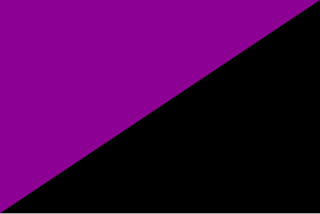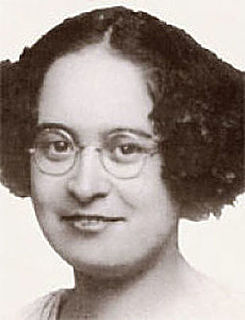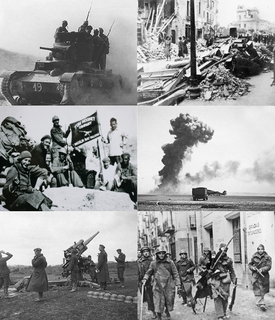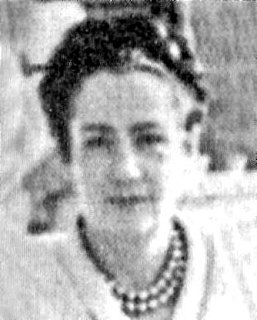Nationality is a legal identification of a person in international law, establishing the person as a subject, a national, of a sovereign state. It affords the state jurisdiction over the person and affords the person the protection of the state against other states.

Anarcha-feminism, also referred to as anarchist feminism, is a system of analysis which combines the principles and power analysis of anarchist theory with feminism. Anarcha-feminism closely resembles intersectional feminism. Anarcha-feminism generally posits that patriarchy and traditional gender roles as manifestations of involuntary coercive hierarchy should be replaced by decentralized free association. Anarcha-feminists believe that the struggle against patriarchy is an essential part of class conflict and the anarchist struggle against the state and capitalism. In essence, the philosophy sees anarchist struggle as a necessary component of feminist struggle and vice versa. L. Susan Brown claims that "as anarchism is a political philosophy that opposes all relationships of power, it is inherently feminist".
Socialist feminism rose in the 1960s and 1970s as an offshoot of the feminist movement and New Left that focuses upon the interconnectivity of the patriarchy and capitalism. However, the ways in which women's private, domestic, and public roles in society has been conceptualized, or thought about, can be traced back to Mary Wollstonecraft's A Vindication of the Rights of Woman (1792) and William Thompson's utopian socialist work in the 1800s. Ideas about overcoming the patriarchy by coming together in female groups to talk about personal problems stem from Carol Hanisch. This was done in an essay in 1969 which latter coined the term 'the personal is political.' This was also the time that second wave feminism started to surface which is really when socialist feminism kicked off. Socialist feminists argue that liberation can only be achieved by working to end both the economic and cultural sources of women's oppression. Socialist feminism is a two-pronged theory that broadens Marxist feminism's argument for the role of capitalism in the oppression of women and radical feminism's theory of the role of gender and the patriarchy. Socialist feminists reject radical feminism's main claim that patriarchy is the only, or primary, source of oppression of women. Rather, Socialist feminists assert that women are oppressed due to their financial dependence on males. Women are subjects to male domination within capitalism due to an uneven balance in wealth. They see economic dependence as the driving force of women's subjugation to men. Further, Socialist feminists see women's liberation as a necessary part of larger quest for social, economic, and political justice. Socialist feminists attempted to integrate the fight for women's liberation with the struggle against other oppressive systems based on race, class, sexual orientation, or economic status.
The connection between left-leaning ideologies and LGBT rights struggles has a long and mixed history. Prominent socialists who were involved in early struggles for LGBT rights include Edward Carpenter, Oscar Wilde, Harry Hay, Bayard Rustin, Emma Goldman and Daniel Guérin, among others.
Mujeres Libres was an anarchist women's organisation that existed in Spain from 1936 to 1939. Founded by Lucía Sánchez Saornil, Mercedes Comaposada, and Amparo Poch y Gascón as a small women's group in Madrid, it rapidly grew to a national federation of 30,000 members at its height in the summer of 1938.

Lucía Sánchez Saornil, was a Spanish poet, militant anarchist and feminist. She is best known as one of the founders of Mujeres Libres and served in the Confederación Nacional del Trabajo (CNT) and Solidaridad Internacional Antifascista (SIA).

Amparo Poch y Gascón was a Spanish anarchist, pacifist, doctor, and activist in the years leading up to and during the Spanish Civil War. Poch y Gascón was born in Zaragoza.

The Catalonia Offensive was part of the Spanish Civil War. The Nationalist Army started the offensive on 23 December 1938 and rapidly conquered Republican-held Catalonia with Barcelona. Barcelona was captured on 26 January 1939. The Republican government headed for the French border. Thousands of people fleeing the Nationalists also crossed the frontier in the following month, to be placed in internment camps. Franco closed the border with France by 10 February 1939.

The Spanish Civil War was a civil war in Spain fought from 1936 to 1939. Republicans loyal to the left-leaning Popular Front government of the Second Spanish Republic, in alliance with anarchists of the communist and syndicalist variety, fought against an insurrection by the Nationalists, an alliance of Falangists, monarchists, conservatives and traditionalists, led by a military group among whom General Francisco Franco soon achieved a preponderant role. Due to the international political climate at the time, the war had many facets and was variously viewed as class struggle, a religious struggle, a struggle between dictatorship and republican democracy, between revolution and counterrevolution, and between fascism and communism. According to Claude Bowers, U.S. ambassador to Spain during the war, it was the "dress rehearsal" for World War II. The Nationalists won the war, which ended in early 1939, and ruled Spain until Franco's death in November 1975.
Major anarchist thinkers generally supported women's equality. Free love advocates sometimes traced their roots back to Josiah Warren and to experimental communities, viewing sexual freedom as an expression of an individual's self-ownership. Free love particularly stressed women's rights. In New York's Greenwich Village, "bohemian" feminists and socialists advocated self-realisation and pleasure for both men and women. In Europe and North America, the free love movement combined ideas revived from utopian socialism with anarchism and feminism to attack the "hypocritical" sexual morality of the Victorian era.

Queer anarchism, or anarcha-queer, is an anarchist school of thought that advocates anarchism and social revolution as a means of queer liberation and abolition of hierarchies such as homophobia, lesbophobia, transmisogyny, biphobia, transphobia, heteronormativity, patriarchy, and the gender binary. People who campaigned for LGBT rights both outside and inside the anarchist and LGBT movements include John Henry Mackay, Adolf Brand and Daniel Guérin. Individualist anarchist Adolf Brand published Der Eigene from 1896 to 1932 in Berlin, the first sustained journal dedicated to gay issues.

The Cartagena uprising took place 4–7 March 1939 during the Spanish Civil War. The troop transport SS Castillo de Olite was sunk during the revolt.

Lola (Dolores) Iturbe was a prominent Spanish anarcho-syndicalist, trade unionist, activist, and journalist during the Second Spanish Republic, and a member of the French Resistance during the Battle of France. She co-founded the anarcho-feminist movement, Mujeres Libres, and of the Comité de Milicias Antifascistas during the Spanish Civil War.

Mercedes Comaposada Guillén was a Spanish pedagogue, lawyer, and anarcho-feminist. With Lucía Sánchez Saornil and Amparo Poch y Gascón, she was the cofounder of the libertarian women's organization, Mujeres Libres. She participated in the Spanish Revolution of 1936. Apart from the numerous articles she wrote for the press, Comaposada published several works, some of them under the name of Mercedes Guillén, a name that had some notability in libertarian circles.
Isabel Mesa Delgado was a Spanish trade unionist, anarchist and Spanish anarcha-feminist worker. While in hiding, she used the pseudonym Carmen Delgado Palomares.
Women in Federación Anarquista Ibérica (FAI) in the Spanish Civil War were often only addressed because of what they appeared to be able to offer male FAI leadership in terms of attracting adept fighters and politicians.

Lesbians in the Second Spanish Republic and Civil War period were doubly discriminated against, as a result of their gender and sexual practices. Prior to the Second Republic, lesbians in Spain were largely ignored, eclipsed by gay men. They faced discrimination as they challenged definitions around what it meant to be a woman. While homosexuality was not condemned by law, it was possible for lesbians to face more severe punishment when charged with violation of morals because of their sexual orientation.

Lesbians in Francoist Spain had to contend with a culture where a fascist state met with a form of conservative Roman Catholicism to impose very rigid, traditional gender roles. In the immediate post-Civil War period, the new regime was not concerned with homosexuals in general, but instead were focused on changing laws to enforce restrictive gender norms like repealing divorce. While original laws banning homosexuality were on the books and enforced using a 1933 law, they were changed in 1954 and 1970. Unlike male homosexuality, lesbians were less clearly addressed by these laws and were much less frequently prosecuted for the crime of homosexuality. Lesbians from that period are hard to identify because they were not identified as such, and often identified as prostitutes instead.
Martha A. Ackelsberg is an American political scientist and women's studies scholar. Her work focuses on the nature of power and its relationship with communities. Cases used in her research include feminist activism in the United States and the Mujeres Libres, an anti-fascist women's organization during the Spanish Revolution of 1936.
14 de abril. La República is a Spanish period drama television series. Set in the Second Spanish Republic, it is a spin-off of La señora, featuring a number of characters from the latter show. Produced by RTVE in collaboration with Diagonal TV and created by Virginia Yagüe and Jordi Frades, the first season aired on La 1 in 2011. The already produced second season was put in the freeze during the seven years of rule of the People's Party, eventually airing from 2018 to 2019.









